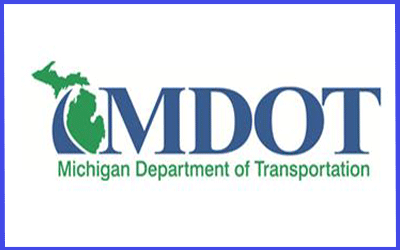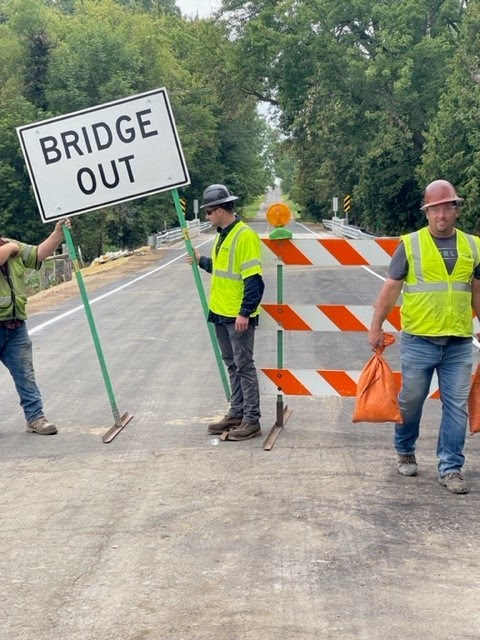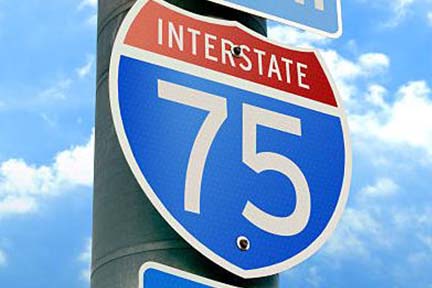
Buttigieg, Whitmer announce $105 million for I-375-boulevard
|
|

|
|

FOR IMMEDIATE RELEASE September 15, 2022
Southbound M-15 (Ortonville Road) to be closed in village of Ortonville in Oakland County to replace culvert
ORTONVILLE, Mich. – Beginning 9 a.m. Monday, Sept. 19, southbound M-15 (Ortonville Road) will be closed at south Granger Road in the village of Ortonville for approximately two months to replace an existing culvert that has been deteriorating and eroding away the shoulder. This work must be done as soon as possible to avoid long-term erosion to the roadway. The lengthy detour will use local paved roads: southbound M-15 to eastbound Oakwood Road, then southbound Baldwin Road to westbound Seymour Lake Road. |

FOR IMMEDIATE RELEASE MDOT lifts traffic restrictions to ease Safety benefits: LANSING, Mich. – This Labor Day weekend, the Michigan Department of Transportation (MDOT) is removing lane restrictions on nearly 60 percent of its road and bridge projects statewide to ease traffic delays for holiday travelers. Beginning at 3 p.m. Friday, Sept. 2, and continuing until 6 a.m. Tuesday, Sept. 6, 96 out of 162 projects statewide will have lane restrictions removed. While motorists will see suspended operations in most MDOT work zones for the weekend, drivers are advised that equipment and certain traffic configurations may remain in place, like temporary shifts or shoulder closures. Travelers are also reminded that, for safety and security, the Mackinac Bridge will be closed to public traffic on Labor Day from 6:30 a.m. to noon during the Annual Bridge Walk. Southbound I-75 and US-2 traffic will be stopped at Exit 344 on the north side of the bridge; northbound I-75 traffic will be stopped at Exit 337 on the south end. For more information, visit the Mackinac Bridge Authority (MBA) website at www.MackinacBridge.org/Walk or call the MBA at 906-643-7600. “This has been one of the busiest years in MDOT’s history with many much-needed projects finally happening thanks to Gov. Gretchen Whitmer’s Rebuilding Michigan program,” said State Transportation Director Paul C. Ajegba. “We thank everyone for their patience during this very busy summer and remind all drivers that there will still be some lane restrictions in place statewide this weekend. For your safety, your family’s safety, and for road workers’ safety, slow down, stay alert and avoid distractions in all work zones. You’re depending on us to fix the roads and road workers are depending on your safe driving. Let’s make sure everyone makes it home each and every night.” MDOT oversees I, M, and US routes and is responsible for nearly 10,000 miles of state highways, which carry more than 50 percent of all traffic and approximately 70 percent of commercial traffic in Michigan. This list is current as of Sept. 1. For the most up-to-date information on MDOT projects, go to the Mi Drive website at www.Michigan.gov/Drive. The following is a list of work zones that will remain active or have lane restrictions during Labor Day weekend. If necessary, detour routes will be posted at the project location. Upper Peninsula – I-75, Mackinac County, has one northbound lane open over the Pine River, north of M-134. – M-28 in Munising, Alger County, has two lanes open between Commercial Street and Bay View Street with a traffic shift. – M-64, Ontonagon County, has one lane open in alternating directions over the Floodwood River west of Ontonagon via temporary signals. – M-94 in Manistique, Schoolcraft County, has a posted detour in place for eastbound and westbound traffic. – US-2 in Bessemer, Gogebic County, has a posted detour in place for eastbound US-2 traffic. – US-2, Gogebic County, has one lane open in alternating directions over Tenderfoot Creek via temporary signals west of Watersmeet. – US-2, Gogebic County, has one lane open in alternating directions over the Cisco Branch of the Ontonagon River via temporary signals west of Watersmeet. – US-41 (College Avenue) in Houghton, Houghton County, has a posted detour in place for southbound US-41 traffic. – US-41 in Marquette, Marquette County, has two through-lanes and a center left-turn lane open between Blemhuber Avenue and Furnace Street with a traffic shift. – US-45, Ontonagon County, has one lane open in alternating directions over Roselawn Creek via temporary signals southeast of Ewen. For more information, contact MDOT Superior Region Communications Representative Dan Weingarten at 906-250-4809. Follow the Superior Region on Twitter at www.twitter.com/MDOT_UP. Northern Lower Peninsula – I-75 in Mackinaw City, Emmet County, has the southbound ramp to US-23 (Exit 338) closed; local traffic is detoured to Jamet Street (Exit 339) to access city streets. – M-55, Iosco and Ogemaw counties, will have one lane of alternating traffic with temporary traffic signals on the bridge over the Au Gres River. – M-66, Charlevoix County, has through-traffic detoured between Lord Road and Lacroix Road via US-131, M-88 and US-31. – US-31, Manistee County, has one lane open at M-22 with a temporary traffic signal. M-22 is closed between US-31 and Schoedel Road. For more information, contact MDOT North Region Communications Representative James Lake at 906-250-0993. Follow the North Region on Twitter at www.twitter.com/MDOT_Traverse. West Michigan – I-96, Kent County, has one westbound lane open with a traffic shift between Whitneyville Avenue and 36th Street. The following ramps will be closed:
– I-96, Kent County, has the eastbound ramp to southbound US-131 closed with a posted detour. The M-37 (Alpine Avenue) ramp to southbound US-131 is also closed. – I-96, Muskegon County, has one lane open in each direction at Hile Road near US-31. The eastbound I-96 ramp to Hile Road is also closed. – I-96, Muskegon County, has one lane open in each direction over Norris Creek near Fruitport. – I-196, Allegan County, has one lane open in each direction over the Kalamazoo River between 130th Avenue and Old Allegan Road with a traffic shift. – I-196, Kent County, has westbound lanes shifted at the I-196 Business Loop (Chicago Drive) interchange in Grandville. The eastbound I-196 ramp to Chicago Drive is closed, and the Chicago Drive ramp to westbound I-196 is also closed. – I-196, Ottawa County, has a traffic shift with two westbound lanes and one eastbound lane open between Hudsonville and Zeeland. – M-6, Kent County, has one eastbound lane open from Thornapple River Drive to I-96. – M-37, Kent County, has the southbound lane closed and detoured between 15 Mile and 13 Mile roads. – M-91, Montcalm County, is closed over the Flat River just north of Stanton Road.
– US-31, Allegan County, has the northbound lanes closed at I-196 with traffic detoured to Adams Street (Exit 52). The southbound US-31 ramp to Washington Avenue/Blue Star Highway is closed. For more information, contact MDOT Grand Region Communications Representative John Richard at 616-262-1565. Follow the Grand Region on Twitter at www.twitter.com/MDOT_West. Southwest Michigan – I-69, Calhoun County, has one lane open in each direction with a traffic shift from I-94 to Ainger Road in Eaton County. – I-69, Calhoun County, has one lane open in each direction between M-60 and Marshall Drive. – I-94, Berrien County, has two lanes open in each direction with a traffic shift from I-196 to Puetz Road. The southbound I-196 ramp to eastbound I-94 is closed and detoured. – I-94, Calhoun County, has two lanes open in each direction at I-69 with a traffic shift. The eastbound I-94 ramp to southbound I-69 and the southbound I-69 ramp to westbound I-94 are closed with detours posted. – I-94, Kalamazoo County, has ramp closures at Portage Road and Sprinkle Road; Portage Road has one lane open in each direction with no left turns at Kilgore Road. For more information, contact MDOT Southwest Region Communications Representative Nick Schirripa at 269-208-7829. Follow the Southwest Region on Twitter at www.twitter.com/MDOT_Southwest Central Michigan and Thumb – I-69, Genesee County, will have two lanes open in each direction from Hammerberg Road to M-54. Ramps throughout the project limits, including at the I-69/I-475 interchange, are closed and detoured. – I-69, Lapeer County, has one lane open in each direction between Lake Pleasant Road and Newark Road. – M-21, Shiawassee County, is closed and detoured at Durand Road. – M-46 (Holland Road), Saginaw and Tuscola counties, may be under flag control between Towerline and Saginaw roads through Friday, Sept. 2. – M-90, Sanilac County, is closed over the Black River and detoured via Todd, Galbraith Line, and Wildcat roads. – US-23 Connector, Arenac County, has the westbound lanes closed. Sagatoo Road is closed and detoured. US-23 through Standish has one lane open in each direction with a traffic shift. For more information, contact MDOT Bay Region Communications Representative Jocelyn Garza at 989-245-7117. Follow the Bay Region on Twitter at www.twitter.com/MDOT_Bay. Southern Michigan – I-69, Clinton County, has the following restrictions:
– I-69, Eaton and Calhoun counties, has the following restrictions:
– I-75, Monroe County, has one lane closed in each direction between Erie Road and Otter Creek Road. – I-75, Monroe County, has the following restrictions:
– I-94, Jackson County, has the following restrictions:
– I-96 Business Loop, Ingham County, has one lane open in each direction between Delta Street and Mildred Street. – I-496 in Lansing, Ingham County, has the following restrictions:
– M-43 (Grand River Avenue), Ingham County, has one lane closed in each direction between Park Lake Road and Oak Point Court. Okemos Road is closed at M-43. – M-50 (Brooklyn Road), has the ramps to northbound US-127 and Oaklane Road closed. – US-12 Business Route (BR)/M-17 in Ypsilanti, Washtenaw County, has the following restrictions:
– US-24, Monroe County, has one lane closed in each direction with a traffic shift from Townsquare Boulevard to Newburg Road. – US-127, Ingham County, has one lane closed in each direction from the Jackson County line to M-36. – US-127, Jackson County, has one lane closed in each direction between south of M-50 (Brooklyn Road) and south of South Street. – US-127, Jackson County, will have the northbound ramp to westbound I-94 closed. For more information, contact MDOT University Region Communications Representative Aaron Jenkins at 517-243-9075. Follow the University Region on Twitter at www.twitter.com/MDOT_LanJxn and www.twitter.com/MDOT_A2. Metro Detroit Macomb County – M-3 (Gratiot Avenue) has two lanes open in each direction between 12 Mile and 14 Mile roads; the eastbound I-94 ramp to M-3 (Gratiot Avenue) is closed. – M-59 has two lanes open in each direction between M-97 (Groesbeck Highway) and I-94. The eastbound I-94 ramps to eastbound and westbound M-59 are closed, as well as the westbound M-59 ramp to westbound I-94. – M-97 (Groesbeck Highway) has the right northbound lane closed from 14 Mile to 15 Mile roads. Oakland County – I-75 has the following restrictions:
– I-75 has the northbound exit ramp to University Drive closed; the Chrysler Drive entrance ramp to northbound I-75 is closed. – I-96 has the following restrictions:
Wayne County – I-75 has two northbound lanes open at Dix Highway. – I-75 has three northbound lanes open from Springwells to Clark streets and three southbound lanes open from Vernor Avenue to Junction Street. – I-75/M-8 (Davison Freeway) interchange has the following restrictions:
– I-94/M-10 (Lodge Freeway) interchange will have the following restrictions:
– I-96 has the eastbound and westbound ramps to eastbound I-94 closed. – I-275 has the following restrictions:
– M-1 (Woodward Avenue) has two northbound lanes open at State Fair Street and two southbound lanes open at Carmel Street. – M-3 (Gratiot Avenue) has all southbound lanes closed from St. Antoine to Brush streets. – US-12 (Michigan Avenue) has two lanes open in each direction between Oakwood Boulevard and Greenfield Road. The westbound US-12 ramp to southbound M-39 is closed. – US-24 (Telegraph Road) has two lanes open in each direction between I-94 and US-12. For more information, contact MDOT Metro Region Communications Representative Diane Cross at 248-752-0336. Follow the Metro Region on Twitter at www.twitter.com/MDOT_MetroDet. |


|
FOR IMMEDIATE RELEASE
August 29, 2022 Dan Weingarten
906-250-4809
WeingartenD@Michigan.gov
Fast facts:
– The Michigan Department of Transportation (MDOT) bridge bundling pilot project moved forward as the Dennis Road bridge over Doan Creek in Ingham County reopened to traffic Friday.
– The pilot currently encompasses major improvements on 19 locally owned bridges in 2022.
– MDOT’s online dashboard at Michigan.gov/BridgeBundling allows the public to track progress on the projects.
LANSING, Mich. – The Michigan Department of Transportation (MDOT) bridge bundling pilot project continues to move forward, with an Ingham County bridge reopening to traffic Friday, Aug. 26.
The Dennis Road bridge over Doan Creek, south of Williamston, reopened about a week early after major repair work. The bridge, built in 1945, was in serious condition, resulting in reduced load restrictions posted on the bridge before the repairs.
Twelve local agency bridge bundling projects are now largely finished, with work on seven others ongoing. Another structure, the Tallman Road bridge in Clinton County, is close to completion and is expected to be finished this week.
This year’s bridge bundling pilot project, the first of its kind in Michigan, is repairing 19 bridges in serious or critical condition that are owned by local agencies. Each bridge will have its superstructure replaced, which includes full removal and replacement of the bridge deck and supporting beams.
All of the bridges encompassed by the bridge bundling program will be completed within 60 or 90 days from the start of repairs.
The pilot project is funded by Federal Highway Improvement Program (HIP) dollars. MDOT bridge staff and consultants are doing preliminary design and construction administration work for the bridge bundling program.
An online dashboard at Michigan.gov/BridgeBundling
The pilot program is only the first phase of the bridge bundling initiative. $196 million in federal COVID relief funds appropriated by Gov. Gretchen Whitmer and the Legislature will allow the state to execute Phase II of the bridge bundling program, beginning planning and development later this year, to address 59 more bridges.
A list of the Phase II bridges, which were prioritized based on regional mobility and safety, is available here. Phase II focuses on closed and load-posted bridges. Some will be permanently removed while others will be fully replaced.
MDOT expects bridge bundling, which covers several bridge locations under one contract, to streamline coordination and permitting, increase economies of scale, and improve bridge conditions on local routes around the state. MDOT is working to expand the approach, already in use on state trunkline projects, to address locally owned bridges.
###
Driving safely in work zones saves lives! Protect MI work zones by taking the pledge.
www.twitter.com/MichiganDOT |

The Dennis Road bridge over Doan Creek in Ingham County was in serious condition before being repaired as part of the Michigan Department of Transportation (MDOT) bridge bundling pilot project. The bridge was reopened to traffic Friday, Aug. 26, after fewer than 60 days of work. The pilot encompasses major improvements to 19 locally owned bridges in 2022. (Photo courtesy of RS&H)

The Michigan Department of Transportation (MDOT) bridge bundling pilot project moved forward as the Dennis Road bridge over Doan Creek in Ingham County reopened to traffic on Friday, Aug. 26. (Photo courtesy of RS&H)

|
|

FOR IMMEDIATE RELEASE August 25, 2022
Southbound I-75 closed from M-102 (8 Mile Road) to I-375 for road and bridge repairs this weekend in Wayne County DETROIT, Mich. – Road repair and bridge work require closing southbound I-75 from M-102 (8 Mile Road) to I-375 from 9 p.m. Friday, Aug. 26, to 5 a.m. Monday, Aug. 29. All ramps from 9 Mile Road through Mack Avenue will also be closed. The freeway-to-freeway detour is southbound I-75 to westbound M-102 (8 Mile Road), then southbound M-10 to southbound I-75. |